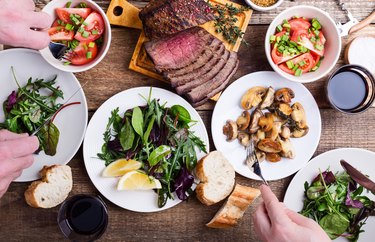
Working a 12-hour shift can have its perks, from a shortened workweek to greater work-life balance. At the same time, there are drawbacks — not the least of which is creating a meal plan for a 12-hour shift.
Long shifts are often exhausting, both physically and mentally, especially if you work as a nurse, an emergency responder or in another type of fast-paced, demanding job. When fatigue sets in, it may be tempting to reach for another cup of coffee or the nearest bag of chips for a quick energy boost.
Video of the Day
Video of the Day
When you know the best foods to pack for a 12-hour shift, however, you can come to work prepared — at least from a nutritional standpoint. Although you can't necessarily predict where your shift will take you, you can control which foods you put in your body.
Shift Work May Impact Diet
A June 2018 study published in the journal Chronobiology International examined the impact of shift work on nurses' food choices and eating patterns.
For the study, researchers gathered information about the daily working lives of nurses with either limited or extensive experience with shift work. Both groups of nurses reported increased food cravings, caffeine consumption and snacking behaviors during night shifts, as well as an inability to drink enough fluids at work.
More experienced nurses added that they were more likely to skip meals due to a high workload. That's despite also reporting that they would prepare home-cooked meals in advance to help manage food intake and stave off fatigue.
The study concluded that shift work can influence the food choices and eating patterns of shift-working nurses. In addition, more experienced nurses tend to draw on a greater range of diet and eating strategies to minimize the impacts of fatigue and sleep loss.
Work Toward Balance
Whether you're a new or an experienced shift worker, you can create a healthy 12-hour shift eating plan that sets you up for success. The 2015-2020 Dietary Guidelines for Americans recommends a healthy eating pattern that accounts for all food groups within an appropriate calorie level.
While caffeine and sugar might give you a momentary boost, they won't sustain you over the course of a 12-hour shift. In contrast, a healthy meal plan for a 12-hour shift will give you lasting energy that fuels your long workdays.
Your meal plan for a 12-hour shift should include a variety of vegetables, fruits, whole grains, fat-free or low-fat dairy, a small amount of oil and lean proteins like chicken and fish. Limit saturated and trans fats, added sugars, sodium and alcohol.
Your individual calorie level for weight loss or maintenance depends on your physical activity level and resting metabolic rate, explains the American Council on Exercise (ACE). ACE's online calculator lets you input your age, weight, sex, height and activity level to estimate your daily calorie needs.
You'll also want to eat the right balance of macronutrients for your goals — that is, a combination of proteins, fats and carbohydrates. Typically, that's around 45 to 65 percent carbs, 10 to 35 percent protein and 20 to 35 percent fat.
However, ACE notes that your own needs and goals should dictate your macronutrient profile. For example, if you're working to lose weight, you may want to consume no more than half your calories from carbohydrates and choose lower-glycemic foods.
12-Hour Shift Eating Plan
Try out the following 12-hour shift eating plan for a week and see what it does for your energy levels. Choose a food from each group and pack your meals for the day in an insulated lunch bag.
Meal 1: Breakfast
- Mason jar filled with Greek yogurt and your favorite toppings, such as chia seeds, fresh fruit, granola and a small dollop of honey
- Hard-boiled egg, fresh fruit or veggies, and half a whole-grain English muffin topped with almond butter
- Lean turkey sausage links with half an avocado and whole-grain toast
Meal 2: Lunch
- Salad with mixed greens, grilled chicken, sliced veggies and balsamic vinaigrette mixed with light olive oil and spices
- Tuna salad or egg salad spooned into fresh avocado halves or atop whole-grain toast
- Whole-grain wrap filled with sliced veggies, baby greens, black beans, avocado and salsa
Meal 3: Dinner
- Chicken or turkey meatballs served over spaghetti squash or chickpea pasta
- Turkey burger with a whole-grain or lettuce "bun" and sliced veggies
- Kabobs with grilled chicken or lean beef and veggies and diced sweet potatoes
Snacks
- Edamame
- Handful of nuts
- Hummus with sliced veggies
- String cheese
- Packet of almond butter
Carry an insulated, refillable water bottle with you so you can be sure you're getting at least eight cups of water throughout the day. You may wish to pack additional healthy snacks that you can eat quickly in case you don't have time to sit down for a meal.
As you're selecting the best foods to pack for a 12-hour shift, remember to measure and track your macros. Meal prep on one of your off days so you have enough meals and snacks for all your shifts.
- Chronobiology International: "The Impact of Shift Work on Eating Patterns and Self-Care Strategies Utilised by Experienced and Inexperienced Nurses"
- Health.gov: "Dietary Guidelines for Americans, 2015-2020: Chapter 1. Key Elements of Healthy Eating Patterns"
- American Council on Exercise: "Tools & Calculators"
- American Council on Exercise: "How to Determine the Best Macronutrient Ratio for Your Goals"
Was this article helpful?
150 Characters Max
0/150
Thank you for sharing!
Thank you for your feedback!